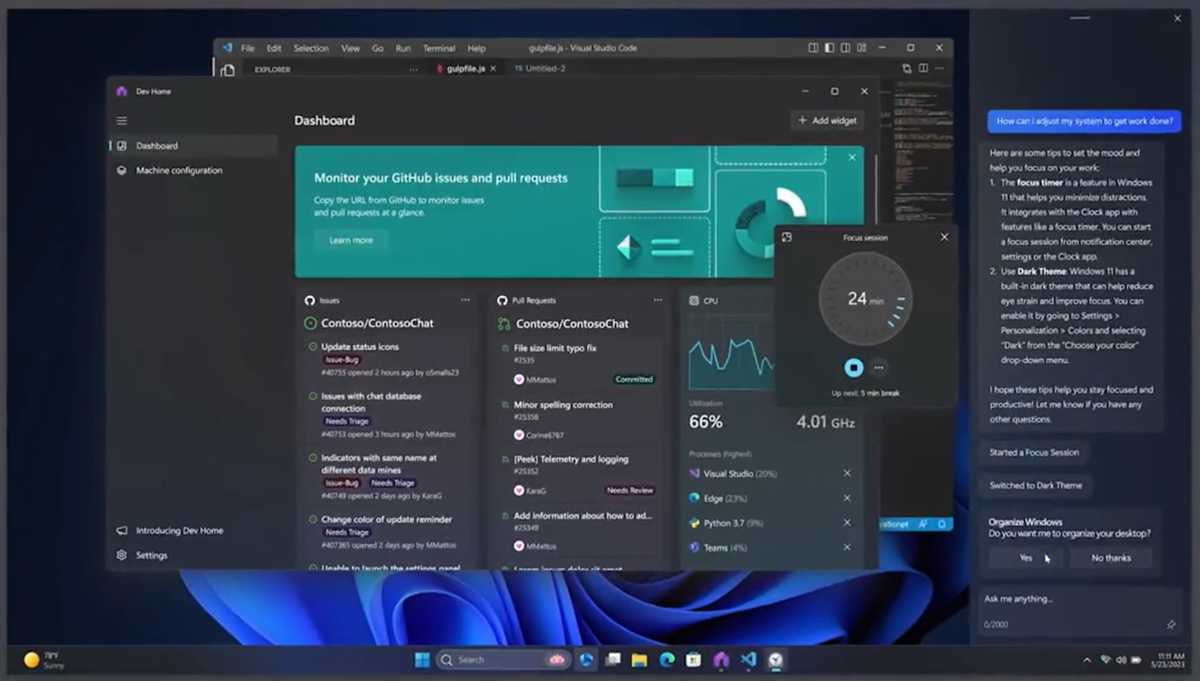Windows Copilot will usher an AI assistant into Windows 11, eight years after Microsoft launched its Cortana assistant alongside Windows 10—then killed it.
Windows Copilot will debut in June, Microsoft will announce this week at its Build developer conference, as a preview for Windows 11. That will most likely set up Windows Copilot for a potential feature release in the fall, though Microsoft hasn’t said when it will release the new feature.
It’s no surprise that AI has emerged as a top priority at Microsoft. However, Microsoft has introduced AI to its users first as a web service with Bing Chat, integrating AI within the Edge Copilot, then adapting it via the Microsoft 365 Copilot to Office apps like Word, Excel, and Teams, and later to Edge. The Windows Copilot sounds more like the latter feature, with Bing Chat’s AI personality potentially dialed way down in favor of a more matter-of-fact assistant. You can expect to see more and more AI integrated into basic Windows services and apps, as Microsoft pushes the throttle to the floor.
“Windows will be the first PC platform to centralize AI assistance with the introduction of Windows Copilot,” Microsoft said as the Microsoft Build conference kicked off. “Together, with Bing Chat and first- and third-party plugins, users can focus on bringing their ideas to life, completing complex projects, and collaborating instead of spending energy finding, launching, and working across multiple applications.”

Microsoft
Microsoft has managed to pull Bing Chat into Windows 11, though it feels a little deceitful. Windows 11 now includes a shortcut to Bing Chat within the Windows 11 search box, but it’s just a link to the Bing.com website which opens Microsoft Edge.
Windows Copilot, meanwhile, sounds like much more of a productivity assistant. “Windows Copilot can be docked in a side pane so that it stays persistent next to any of a user’s apps, always there to provide assistance no matter what they’re doing—getting inspired, planning, communicating, creating,” Microsoft says.
It’s ironic, of course, because AI has been a central feature in Windows before. Windows 10 launched with Cortana as part of the operating system, writing emails on command, setting reminders, and reading emails. But Cortana’s role within Windows steadily diminished, and today the assistant is little more than an app that you can launch like any other. Was Cortana simply ahead of what consumers wanted, or will Copilot and Cortana eventually merge?
AI across the Store and more
As you might expect, Microsoft isn’t just stopping with Windows in its AI efforts. The Windows Store is getting a bit of an AI makeover, with an “AI hub” of the best AI experiences. Microsoft will even use AI to generate searchable keywords for each entry, and use its AI-powered summarization features to provide a comprehensive interpretation of user reviews.
Microsoft is also taking cues from ChatGPT, the AI-powered chat service developed by OpenAI on the ChatGPT foundation that Bing also uses. ChatGPT already announced plans to browse the web (which Bing does) and use plugins (which ChatGPT has delivered on, and Bing so far has not.)
To improve both platforms, OpenAI and Microsoft agreed to use a common plugin format so that both companies could benefit from third-party development. Microsoft is also working on plugins for Microsoft 365 Copilot, and will announce at Build that about 50 are in the works from Atlassian, Adobe, ServiceNow, Thomson Reuters, and more, with “thousands” more to come, Yusuf Mehdi, Microsoft corporate vice president of modern life, search and devices. OpenAI’s ChatGPT also said that it would use Bing as its search engine for browsing the Web.
Remember, until now, AI chatbots have been trained up until 2021, and will remind you of that if you ask for more current information. With the addition of Bing to ChatGPT, plugins, as well as Windows Copilot, the state of AI is rapidly advancing, we’re starting to see AI foundations move into the modern age.
This story was updated with additional information at 9:58 AM.

